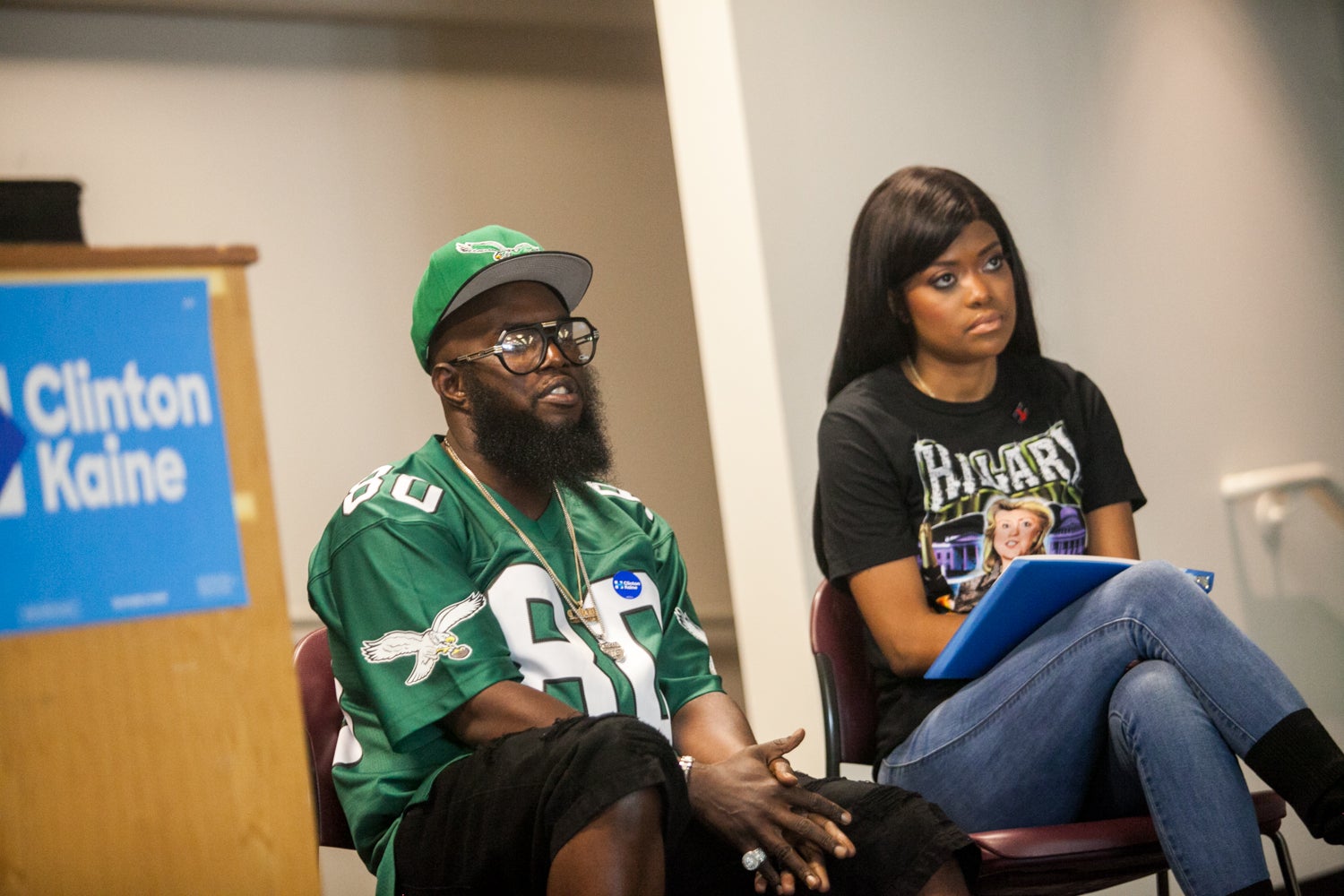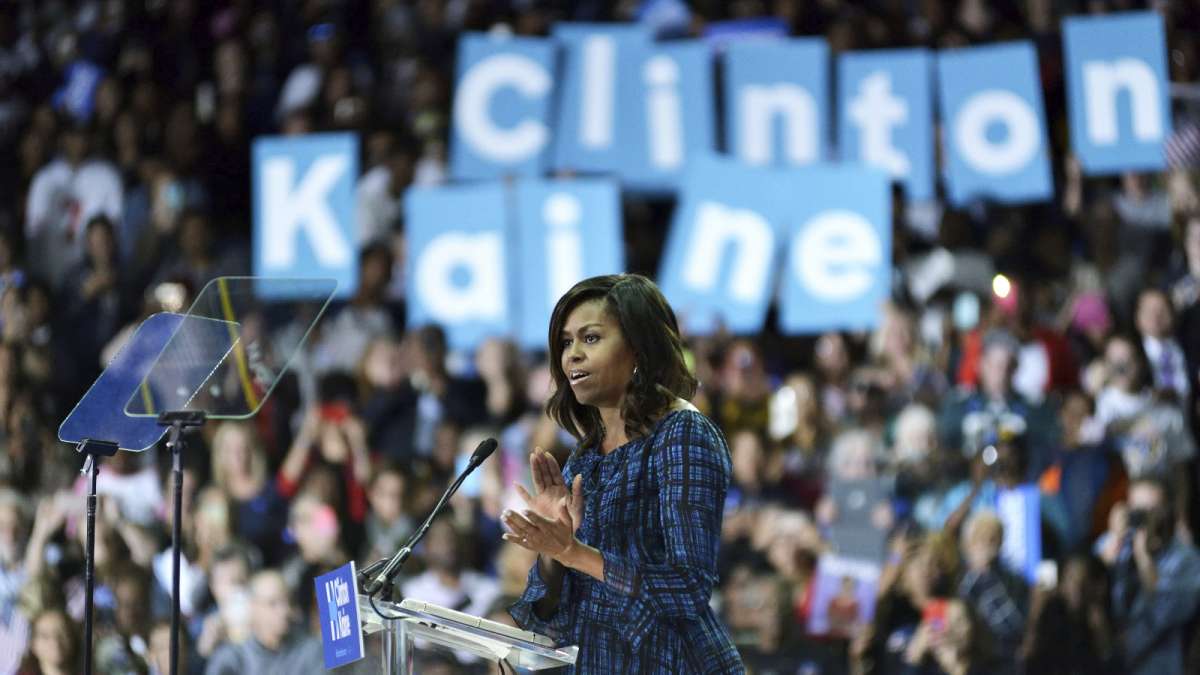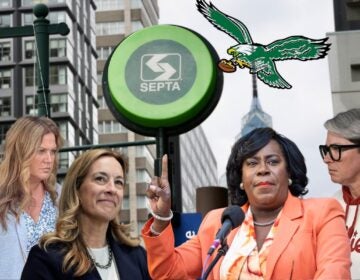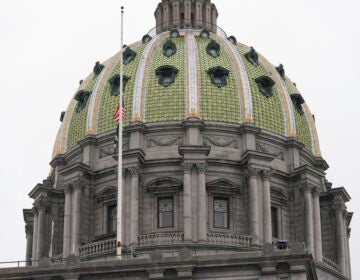Courting millennial support, Clinton bolsters outreach to young African-American voters
Listen
Philadelphia rapper Freeway and social media personality Karen Civil campaigneed for Democratic presidential candidate Hillary Clinton Friday at Temple University. (Brad Larrison for NewsWorks)
On a sunny Friday afternoon at Temple University, about 40 college students gathered to listen to Philadelphia hip-hop star Freeway talk — not about his days touring with Jay-Z, but about why he supports Hillary Clinton.
“Back then in 2012, I didn’t have health care,” said Freeway, real name Leslie Pridgen, during the appearance last month. “So, just for my medicines, I was spending $600 or $700 a month.”
In 2012, Freeway was diagnosed with end-stage renal failure.
Clinton’s support of Obamacare, as well as Freeway’s Muslim faith, are the main reasons he is supporting the Democratic candidate.
“This guy Donald Trump wants to ban Muslims from coming into our country, and we cannot have that,” Freeway said. “Hillary Clinton knows that anybody who wants to ban Muslims from coming into the country must’ve lost their mind.”
Freeway, along with social media personality and writer Karen Civil, spoke to students that day about the importance of voting in this election, specifically for Clinton. It is a part of a bigger push to get young, black voters to the polls across the country.
Clinton’s campaign continues to amass a number of high profile black celebrity supporters. Along with Freeway, hip-hop stars Pusha T, Chance the Rapper and Snoop Dogg are on board. At a number of Chance’s shows, especially those on or near college campuses, students are going through the crowd campaigning for Clinton, as noted by NPR reporter Jonquilyn Hill.
At George Mason’s campus for the Chance the Rapper concert. I’ve have been approached by 3 students campaigning for Clinton.
— Jonquilyn Hill (@jonquilynhill) October 6, 2016
Clinton was also recently endorsed by NBA superstars LeBron James and Steph Curry, a rarity among today’s pro athletes. Her campaign released an ad last week featuring the cast of the popular Fox show “Empire.”
The ad features Taraji P. Henson, Gabourey Sidibe, Lee Daniels, and others imploring young African-American voters not to sit out Election Day.
“So many women and men died for us to have the right to vote,” says Daniels, the show’s producer, in the ad. “Every time we sit out, we dishonor their sacrifices.”
Democratic all-stars aid Clinton efforts
While Clinton enjoys widespread support from African-Americans as a whole, she has struggled to find her footing with black millennials. It was the youth vote that helped buoy Barack Obama in 2008 and 2012. In response, Clinton has also enlisted the help of President Obama, first lady Michelle Obama, and her opponent in the Democratic primaries, U.S. Sen. Bernie Sanders.
 First Lady Michelle Obama stumps for Hillary Clinton at La Salle University. (Bastiaan Slabbers for NewsWorks)
First Lady Michelle Obama stumps for Hillary Clinton at La Salle University. (Bastiaan Slabbers for NewsWorks)
Her campaign workers fear that these young voters, many of whom supported Sanders, will either stay home or vote for a third party in protest — and that could sway the election toward Trump.
“I was Team Bernie,” said McKayla Warwick, 18. A freshman at the University of Pennsylvania and a native of Lynchburg, Virginia, Warwick will be voting in her first presidential election.
She, like many of her friends, supported Sanders during the primary. Once he lost, however, she quickly switched her allegiance to Clinton. Some of her friends, on the other hand, have been a bit of a tough sell.
“I say I have five really good friends, and three of them are currently on the track with me to vote for Hillary,” Warwick said following Michelle Obama’s Sept. 28 rally at LaSalle University. “And then there are two that we’re still kinda working on, and we’re like, ‘C’mon guys you have to realize that this election is crucial.'”
Meanwhile, Donald Trump has consistently polled in the low single digits — and, in some cases, at zero percent — with African-Americans. His attempts last month to interact with the black community in Detroit and Philadelphia were not well-received.
The only young, black voices heard while he spoke at an invite-only function at a North Philadelphia church on Sept. 2 were the ones protesting in the streets.
While Obama’s historic run to the presidency energized African-Americans to vote in record numbers, Clinton has struggled to stoke that kind of fire in her quest to become the country’s first woman elected president.
‘The bigger picture’
“Last election was kinda historic,” said Ray Lewis III, 26 of Oak Lane in North Philadelphia. Lewis supported President Obama in 2008 and 2012 and will back Clinton this year.
He feels the lukewarm response to Clinton could have as much to do with election fatigue as it does the candidate herself.
“He was the first black president, so I feel like that really made people want to vote, especially black people,” Lewis said. “But now, it’s just like, ‘Eh, I’m doing OK. I make $60,000 a year, my family’s all right, things are cool.’
“But people gotta look at the bigger picture,” he said.
Clinton’s support for easing the burden of student loans, raising the minimum wage, and speaking out against police killings of black citizens, has struck a chord with voters Warwick and Lewis. But a perceived enthusiasm gap remains.
Lewis said young voters who oppose Trump may be apathetic now because they don’t believe he can win.
“People may not take it seriously until the week before,” he said. “Like, ‘Oh, it could really happen. He could be president.’ Or, he might get into office and people will be like, ‘Oh my gosh, we let this happen,’ and then maybe the next four years, they’ll get it together.”
WHYY is your source for fact-based, in-depth journalism and information. As a nonprofit organization, we rely on financial support from readers like you. Please give today.




